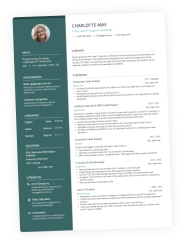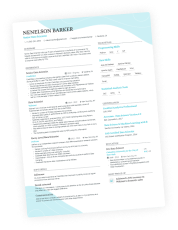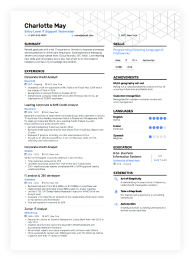If you have had some interviews already, you have probably noticed that most interviews end the same way – by the interviewer asking you whether you have any question.
And as experience shows us, saying a “no” is not an option.
A crucial part of your interview and whether you will get the job is asking a few smart and tailored questions.
You might ask yourself why, and we are here to help you.
In this article, we are going to find the answers for the following questions:
- Why is it important to ask questions at the end of your interview?
- What are the most essential questions to ask at the end of your interview?
- What questions you should avoid asking during your interview?
And once we are done, you should be ready to end your interview on a positive note.
So, if you are ready to learn more about that topic, let’s dive in.
Is your resume good enough?
Drop your CV here or choose a file. PDF & DOCX only. Max 2MB file size.
Why is it important to ask questions at the end of your interview?
Before we go any further, it is important for you to understand why it might be crucial for you to ask questions at the end of your interview.
There are many interview questions that you will be asked throughout your interview, but the last one will most certainly be “Do you have any questions for me?”.
Many candidates simply answer “No” when asked, but that is in fact the worst possible answer that you can give.
Lacking questions for the interviewers at the end of your interview, it would seem like you have lack of curiosity and low level of engagement on your part.
After all, there is no way for you to know everything about the position and the company, and not asking about neither one, simply does not look good.
On the contrary, if you have a few well-rounded questions to ask the interviewer, you will end your interview on the right note.
Not only does that show that you have done your research before the interview, but it also gives the interviewer a chance to get to know you, as the questions you ask also reveal about who you are.
The most essential questions to ask at the end of your interview
Now that you know why is it so essential to ask questions at the end of your interview, you might ask yourself what should you ask the interviewer.
We got you covered, we have prepared the best 14 questions that you can ask at the end of your interview.
1. What's the best thing about working here?
This is arguably the best question you can ask at the end of your interview.
It is absolutely on point, and will surely impress the hiring manager.
Furthermore, it can give you tons of information right away that would make it easier for you to determine if you see yourself in the company.
Here are just a few of the purposes this question serves:
- Helps for the interviewer to remember you – as most candidates prefer to talk about themselves, this question comes as a fresh breath of air
- Shows that you are interested not only in the job you are applying for, but in the company itself
- You can get some valuable insight on the company – it is just the opinion of one person, but you can still get a good idea if the company would be a good fit for you
- Depending on the interviewer’s answer, it can open up the door for follow-up questions for you to ask
2. How do you evaluate and define success in this position?
This is one of the favourite questions of most hiring managers.
If anything proves that you are really a goal-oriented professional – it is that questions at the end of your interview.
Furthermore, the interviewer’s answer can give you a great insight on what would be expected of you in that job position.
However, if the interviewer can’t answer this questions, that should be a clear red flag for you – it shows lack of clear structure and expectations.
3. What's the structure of the team/department?
This is yet another way to get a great insight on the company, and the team or department you would be working in.
The interviewer’s answer would not only help you get a better understanding of your potential responsibilities, but it will also give you information if you would have any peers in similar roles.
4. What is the typical career path for someone in this position?
This question is a great way to learn if there could be an opportunity for a promotion for you anytime soon.
The interviewer’s answer can give you some valuable information regarding whether this position is a career-building opportunity, or a dead end.
Furthermore, asking this questions can actually help your chances for getting the job, as you would seem ambitious, and that is always a good thing.
5. What would you like to change in the company?
When asking this question, you can never be sure what kind of answer you would receive from the interviewer.
The interviewer can share any of the following:
- A current problem they are trying to resolve in the company
- An aspect of the job that might be frustrating
But the answer can also include something else entirely.
Either way, you are likely to get some useful insight into what it would be like working there.
6. Can you describe a typical day for someone in this role at your company?
That’s one more question that you can use to get some useful insight that would help you determine if you would feel good within the company.
It can also help you verify your potential responsibilities, as well as the scope of your role.
7. How would you describe the company's culture?
This question is a great pick for the end of your interview, as it functions on two different levels:
- It shows the interviewer that you care about finding the right cultural fit in your next position
- You can get some insight on the company’s culture and how it prioritizes employee satisfaction
8. How do you think the company defines and demonstrates its values?
Just like asking about the company’s culture, asking about its values can give you some great insight.
With the interviewer’s answer, you will not only understand better how the company operates on the inside, but you will also show the interviewer that you have researched the company and want to know how it would align with your own values.
9. How would I collaborate with my supervisor?
With all the different leadership styles out there, it would really help you to know how managers in this company interact with their employees.
It will help you take a better decision whether the company is the right fit for you and whether you will be able to use your full potential to contribute to the company’s success.
10. Apart from the technical skills required to succeed in this role, what soft skills do you think will serve the company and position best?
This is yet another question that would help you decide if you would be a good fit for the company.
The soft skills that the company values can help you determine what are the most important aspects of the job and if the team would be what you are looking for.
11. Is this a new position? If not, why did the person before me leave this role?
This question might feel a little awkward to ask, but the fact is, you are entitled to that information to take the best decision for yourself.
There is much difference between an employee being promoted and freeing the position, and an employee quitting their job due to some reason.
If the case is as the second one, you need to try to understand what their reasons for quitting has been, and whether you would feel comfortable in that position.
12. What are your expectations for this role during the first 30 to 60 days?
The information you can get from that questions can be crucial for successfully getting the job you are interviewing for.
Not only would it help you understand what would be expected of you and the metrics of success that the company is using, but it will also help you tailor your qualifications in the next interview steps in order to fit the role better.
13. Can I provide any further details that would be helpful in making your decision?
Once you are towards the end of the questions you want to ask the interviewer, you should try to end with two significant questions – this is the first one.
By asking that questions, you give the interviewer the opportunity to ask you follow-up questions about what you have discussed earlier.
They might ask you to clarify something you said at some point, or they might ask for some details on certain matters.
Either way, asking that question will surely show the interviewer that you are still interested in the job opportunity after the main part of the interview.
14. What are the next steps?
This is possibly the best last question to ask the interviewer at the end of your interview.
As different companies have different hiring processes, it would be good to know what timeframes to expect in the current hiring process.
This is also the place to mention any time-sensitive information, such as currently considering other offers, or figuring out arrangements for relocation, transportation, or adjusting to a new schedule.
Questions you should avoid asking during your interview
Now you know the best questions that you can ask at the end of your interview, but we also need to have a look at the types of questions you should never ask at that stage.
We have prepared for you the top 3 topics you should stay away from.
1. Questions about money and benefits
Generally, it is a bad idea to bring up the topics of money and benefits during your interview, no matter how tempting it might be.
If you really need to know that information, instead of brining it up during the interview, you can contact the HR representative in charge of the hiring process for this position.
However, if you get a job offer, you will find out everything you need to know about the salary and benefits, and you will most likely have the chance to negotiate them.
2. When you can take your first holiday
When you are interviewing for a position, you would want to focus on your experience and skills, and how you can contribute to the work processes in the company.
However, asking about taking days off during your interview shows that you are already thinking about not working.
And you would not want to be remembered with that when the decisions for hiring for that position is being taken.
3. How well you did during the interview
You might be tempted to ask how well you did during your interview, but it is always a bad idea.
You will certainly get that information when the company reaches out to you, and asking about it before the interview is even over, might effectively erase your chances of getting the job.
Takeaways
We are all done, now you know why is it important to ask questions at the end of your interview, and which questions are best and worst for that purpose.
Let’s go through all the important information you would like to extract with all your questions:
- You would like to get a better idea of how the company operates
- You would like to understand what the company values, and what its culture stands for
- You would want to know more about the day-to-day work and responsibilities
And don’t forget to end your questions with the following two:
- Can I provide any further details that would be helpful in making your decision?
- What are the next steps?
Also, remember to avoid topics like money, benefits, and vacations days.
Check out our list of questions that you can ask at the end of your interview to get the most information on the position and the company, and prepare the questions for your next job interview.



